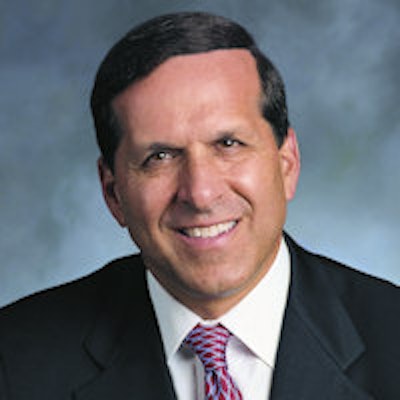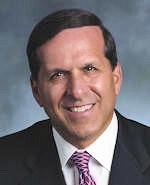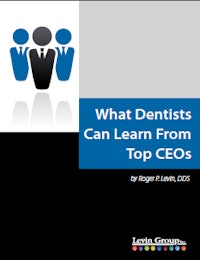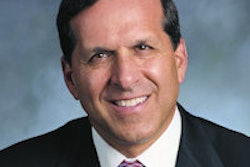
DrBicuspid.com is proud to present an excerpt from Dr. Roger P. Levin's latest book, What Dentists Can Learn From Top CEOs. This book draws together many observations about how techniques used by top corporate leaders can be applied successfully in dental practices.
The following is an excerpt from the chapter entitled "CEOs Make Decisions Quickly."
 Roger P. Levin, DDS, chairman and CEO of practice management consulting firm Levin Group.
Roger P. Levin, DDS, chairman and CEO of practice management consulting firm Levin Group.Separating the 2% decisions from the 98% decisions
Sitting at a dinner with other CEOs, I asked one of them what single trait, more than anything else, was responsible for his success. He thought for a moment and then said something that changed my life.
He said that 98% of all the decisions he ever made in his life didn't actually matter -- that his success was really about how well he handled the "2% decisions." He explained that 2% decisions are the ones that really matter. If you get them wrong, you will pay a significant price in your life or career. The other 98% just do not matter very much in the long run.
Take that message to heart, as I did, and you will be taking a giant step toward being an excellent practice leader.
First, let's quickly dispense with the 98%.
With 98% of the nonclinical decisions we must make, the best approach is to make them very quickly and not spend time second-guessing yourself or changing your mind. Ask yourself what the consequences will be -- an hour lost, a bad meal, a small investment that doesn't pay off? In the long run, so what? These are not earth-shattering and do not merit much of your time. The CEO who explained this to me said he had made plenty of 98% decisions correctly and some incorrectly. I now realize that the same is true for me -- and if you think about it, it's probably true for you as well. With minor issues such as what to eat for lunch, what movie to see, when to call a friend, and a thousand other examples, decide quickly and move on. Tomorrow, or a month from now, or next year, we will not be kicking ourselves for making a bad 98% decision.
Now, let's focus on the all-important 2%.
The stakes are much higher with the 2% decisions a practice leader must make. These involve such matters as relocating your office, bringing a partner or associate on board, or investing 20% of your net worth in a new venture. These decisions merit serious attention. In fact, given the potential rewards or losses, it usually makes sense to engage the services of an expert to help you arrive at the best possible decision. Good CEOs do this routinely. That's part of why they get most of these major decisions right.
Once I learned this 2% rule, I became a much better decision-maker. I make most decisions (98% of them) very quickly and easily, without anxiety. With the 2%, I now have an excellent batting average because I never make them alone. I gladly spend money to get the advice of an attorney, accountant, consultant, certified financial planner -- whatever kind of expert I need.
Is that a 98% decision or a 2% decision?
“Ask yourself throughout the day whether what you are facing is a 98% decision or a 2% decision.”
Dentists make nonclinical decisions all day. Think about it. A team member is not performing well. A patient wants to come in right away, even though there is no opening in the schedule. A sales rep shows up by surprise selling something the dentist might be interested in. Should the doctor attend a clinical course that's just been announced? How about staff?
Far too many dentists treat the majority of their 98% decisions as if they were 2% decisions. This wastes time, distracts from more important issues, slows overall progress, and drains the doctor's energy. These consequences are much more damaging than making some wrong 98% decisions would be. In other words, on a cost-versus-benefit basis, you are better off if you quickly decide or delegate those decisions rather than agonizing over them yourself.
How do you know when you are confronting a genuine 2% decision?
First of all, all clinical decisions are obviously 2% decisions. Achieving an excellent clinical outcome, serving the best interest of the patient -- these always deserve the dentist's utmost attention. However, relatively few managerial decisions fall into the 2% category. Here are several that meet this standard in most general practices, in the form of questions:
 What Dentists Can Learn From Top CEOs by Dr. Roger Levin.
What Dentists Can Learn From Top CEOs by Dr. Roger Levin.- Does the practice have documented, step-by-step systems?
- Does the practice have an internal marketing program with 15 strategies in place at all times?
- Does the practice have a part-time internal marketing coordinator?
- Does the practice have proper insurance?
- Does the doctor consult a dental-knowledgeable certified financial advisor?
- Does the practice have a budgeting system to organize and monitor practice financial performance?
- Does the practice actively offer outside patient financing?
These are all 2% decisions because the wrong answer to any of them can be extremely costly to the practice and the dentist personally.
CEOs make most decisions quickly, because they are in the 98% category. Dentists can benefit tremendously by learning this technique. Ask yourself throughout the day whether what you are facing is a 98% decision or a 2% decision. If it is a 98% decision, make it quickly and move on. You will have little to lose and much to gain.
Roger P. Levin, DDS, is the chairman and CEO of practice management consulting firm Levin Group.
Special for DrBicuspid.com members
Order What Dentists Can Learn from Top CEOs today and receive a $100 discount when you use code LG13100.
The comments and observations expressed herein do not necessarily reflect the opinions of DrBicuspid.com, nor should they be construed as an endorsement or admonishment of any particular idea, vendor, or organization.
Copyright © 2014 Levin Group, Inc. Reprinted with permission.



















